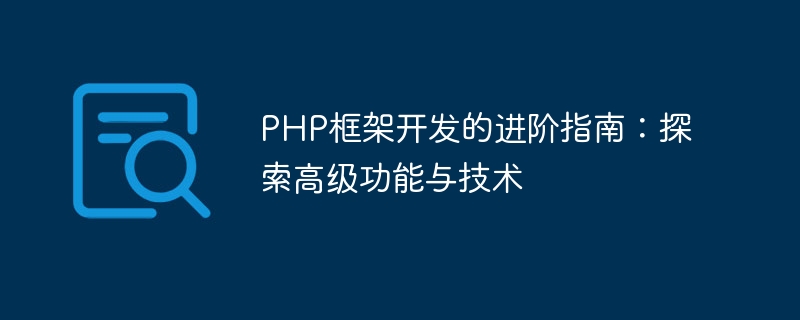

Advanced Guide to PHP Framework Development: Exploring Advanced Functions and Technologies
With the development of Internet technology, the use of PHP framework has become more and more widespread, and it has become a Essential tool for web applications. However, as time goes by, developers have become very proficient in basic PHP framework development, and they are eager to explore deeper technologies to improve the performance, stability, and security of web applications. This article will discuss an advanced guide to PHP framework development, introduce some advanced functions and technologies, and help developers better master PHP framework development.
1. Use Composer for dependency management
Composer is a PHP dependency management tool. It can help us manage the dependencies of PHP projects and install, update and uninstall these dependencies. Using Composer can solve the dependency problem of PHP application package management, and also conveniently manage libraries and frameworks. In PHP framework development, using Composer for dependency management can save a lot of time and energy.
2. Use automatic loading
In the PHP framework, using automatic loading can reduce the burden on developers and improve application performance. In actual development, we can set up the automatic loading mechanism so that PHP files are automatically loaded when needed, without having to use require or include statements in each file to load files. This can reduce the amount of code and improve the readability and maintainability of the code.
3. Use the factory pattern
The factory pattern is an object-oriented design pattern that can improve the maintainability and scalability of the code. In the PHP framework, the factory pattern can help us better organize the code, abstract the instantiation process of the object, and make the code clearer. The factory pattern has great flexibility and can configure the object instantiation process based on parameters or configuration files to meet different needs.
4. Using DI container
Dependency injection container (DI) is another commonly used advanced feature of PHP framework. Dependency injection containers inject dependencies into objects through configuration files or code, thereby achieving decoupling between objects. In this way, we can avoid tight coupling between codes, making the code more flexible and easier to maintain.
5. Use caching mechanism
In actual development, it is often necessary to cache large amounts of data to improve application performance. The caching mechanism in the PHP framework can reduce access to databases or other resources and improve application access speed by caching data structures and algorithms. Commonly used caching mechanisms include file cache, memory cache and Redis cache. Developers can choose the most appropriate caching mechanism based on application scenarios to improve application performance and availability.
6. Use the ORM framework
The ORM framework can map data in a relational database into an object model, allowing developers to process data more flexibly. In PHP framework development, the ORM framework can help us simplify database operations and improve development efficiency. Commonly used ORM frameworks include Doctrine and Eloquent. Using the ORM framework, developers can focus more on the implementation of business logic without having to worry about the details of the database.
7. Security
Security is an issue that must be paid attention to during the development of the PHP framework. Developers need to pay attention to preventing SQL injection, XSS cross-site scripting attacks, CSRF attacks, and security vulnerability prevention. During the development process, we can adopt some security strategies to enhance the security of the application, such as input validation and output filtering.
This advanced guide to PHP framework development can help developers better master PHP framework development by exploring some advanced functions and technologies. By using technologies such as dependency management, automatic loading, factory mode, DI containers, caching mechanisms, and ORM frameworks, combined with security considerations, the burden on developers can be reduced and the performance, stability, and availability of applications can be improved. At the same time, developers continue to learn and improve their abilities, and will be better able to deal with various challenges and problems during the application development process.
The above is the detailed content of An advanced guide to PHP framework development: Explore advanced features and techniques. For more information, please follow other related articles on the PHP Chinese website!




